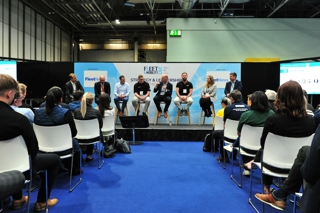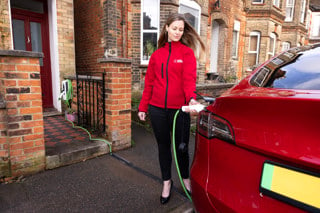Electric vehicles offer huge benefits to companies and their drivers, but a number of obstacles still need to be overcome, according to Athlon managing director, Patricia Wolfe.
As part of Athlon's sponsorship of the Fleet News Electric Fleet report, Wolfe outlined how the drive towards electrification is changing the fleet industry and how Athlon can help companies to achieve their electric targets without compromising the success of their businesses.
Current trends and advantages of electrification
Sustainability commitments are a significant catalyst for companies to adopt an decarbonisation strategy, but there are also cost and oeprational advantages to transitioning a fleet of petrol or diesel cars and vans to electric, according to Wolfe.
“Many fleets are making the transition to EVs to meet environmental, social and governance (ESG) and corporate social responsibility (CSR) goals, driven by sustainability commitments," she said.
However, she added that, while EV list prices are often more expensive than internal combustion engine (ICE) vehicles, lower priced models are on the increase while the in-life costs can be lower.
Fewer moving parts means less maintenance and generally fewer breakdowns. Similarly, even ignoring the lower cost of electricity versus petrol and diesel pump prices, EVs can present savings for organisations whose operations take them into low emission zones, or congestion charge areas.
“We have seen an increase in salary sacrifice uptake, too,” Wolfe commented. “An EV obtained through a salary sacrifice scheme will save both the employee and the employer money by way of reduced National Insurance contributions.”
Average lengths of contracts do not seem to have been affected by the trend towards EV, but Wolfe noted that leasing is being seen as more attractive than outright purchase as customers prefer the leasing company to carry the residual value risk.
“Using total cost of ownership (TCO) analysis, it’s also possible to show how competitive an EV can be as opposed to a traditional combustion engine over the life of its contract,” she said.
Additionally, given the pace of change and improvements that come with every generation of EV evolution, a three- or four-year change cycle remains popular. Newer electric vehicles benefit from significantly better range capabilities than older-generation models, as well as faster charging.
Challenges for fleets
Nevertheless, challenges remain for companies looking to transition to electric, including suitability for higher mileage roles and concerns about the public charging infrastructure.
Athlon’s EVReady tool can help dispel such concerns. The tool enables fleet managers to measure their drivers' typical work and personal journeys to evaluate the right vehicle and charging regime, and, if needed, what infrastructure needs to be invested in.
However, the biggest challenge facing businesses wanting to transition to electric is rooted in the hearts and minds of their drivers, claimed Wolfe. She emphasised the importance of overcoming this challenge by including drivers in the electrification process.
"Any transition plan should include driver training and a robust fleet policy that highlights the behaviours and expectations for drivers," she said.
"Involve drivers and employees in the transition process in addition to the training and onboarding, give employees access to demo vehicles before making the change.
"Let them touch, feel and drive the vehicles, and address any concerns before the overall implementation."
The clarity of the 2030 deadline
The government’s recent announcement about the 2030 ban on the sale of new ICE-only cars provides clarity about the expectations facing fleets in terms of the transition to zero emission technologies.
“The transparency around the dates and scope of the ban will provide fleet managers with the clarity they need to pull together a timeline and a structured transition plan,” said Wolfe.
Phasing out ICE vehicles and integrating EVs into fleets should become part of the natural renewal cycle, athough the upcoming deadline puts greater pressure on investment in a national public charging infrastructure.
Similarly, demand for EVs must be stimulated in the used vehicle sector to give retail customers the confidence to move to elecyric and to support residual values.
Additionally, Wolfe explained that the initial P11D cost of an EV should not be a fleet manager’s only point of consideration.
“We are encouraging fleets to take a keener focus on the total cost of ownership, including fuel savings, maintenance, and vehicle off-road (VOR) rather than just the initial price tag of a generally more expensive EV – which is important for fleet managers when trying to get senior management buy-in," she said.
"This comprehensive cost analysis is key to illustrating the financial benefits of electrification.”
This article is a paid for partnership with Athlon
More on electrification
Athlon’s expertise on the EV transition allows it to provide significant assistance to fleets on their electrification journeys. This is why the brand is sponsoring the Electric Fleet Report from Fleet News, available now on the Fleet News website.
Keep up with the leading insights on electrification and other industry topics by signing up for the Fleet News digital newsletter.






















Login to comment
Comments
No comments have been made yet.